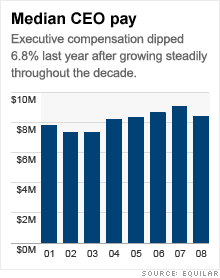Getting serious on CEO pay
Nine companies agree to adopt guidelines aimed at reforming executive compensation and giving more transparency to shareholders.

NEW YORK (CNNMoney.com) -- A handful of major corporations have agreed to change the way they pay their employees, as calls to reform executive compensation structures heat up.
AT&T (T, Fortune 500), Cisco Systems (CSCO, Fortune 500), Hewlett-Packard (HPQ, Fortune 500), Tyco International (TYC) and the Nasdaq OMX Group (NDAQ) are among the nine companies pledging to adopt guiding principles set forth by The Conference Board, a business research firm.
The companies agreed to clearly link pay to performance, provide fair and "affordable" compensation, eliminate excessive golden parachutes, ensure the board oversees the pay packages and increase transparency with shareholders, according to a Conference Board report released Monday.
"You can't be in the top 25% in pay if you're in the bottom 75% in performance," said Bill Ide, director of the Conference Board's Task Force on Executive Compensation and partner at McKenna Long. "That's universal. We think all regulators and policy makers would be comfortable with that."
Growing debate over regulation. The report comes at a time of building scrutiny from lawmakers over pay packages and a push by the Obama administration to reform the way financial institutions do business both internally and externally.
Legislation is not needed to govern executive compensation, said The Conference Board, adding that it believed its guidelines are a more effective means of regulating pay packages.
Ide acknowledged that the subject of executive compensation is very frustrating for members of Congress and the president because of the growing public unrest over bonuses, but he argued that the report's guiding principles are sufficient.
The report said a series of catch-all laws would not provide the flexibility needed for companies in different sectors to effectively manage executive pay practices unique to their industries. Also, the group rejected pay caps, saying pay limits would ultimately hurt competition.
"It's just not possible for legislation to understand the different stages of companies' development and needs in different industries," said Ide. "There is a real need for shareholders to step up and hold boards to these guidelines, but I don't see how, beyond that regime, you can add much. We really have to push this self-governance principle forward."
Still, the idea of stricter regulations is gaining momentum in Washington, including a looming Federal Reserve proposal that would give the central bank the power to oversee pay practices at some of the biggest financial institutions. In a speech last week, President Obama pushed for giving shareholders more say in executive pay packages.
Push for 'Say on Pay.' So far, Congress has moved sluggishly. Plans on the table would ensure big Wall Street paychecks get more thorough examinations, but they wouldn't be subject to strict limits.
One idea that has the full backing of the Obama administration is the "Say on Pay" rule that would give shareholders the right to issue a non-binding statement on executive pay packages. The idea has come up many times before in shareholder proposals over the years, but the vast majority have been rejected.
"Everyone's talking about say on pay, but that's not a dialogue," said Ide. "We need a real dialogue between boards and the stakeholders, and you can't manage that by legislation."
But supporters of say on pay legislation argue it could have a real impact on executive compensation regulation by giving shareholders a voice.
"We have given companies a chance to regulate themselves over the past decade, and it's true that they have not really done that," said Corporate Library senior research associate Paul Hodgson. "If you bring shareholders into that ring with sufficient influence, there may be some movement."
Hodgson pointed out that the United Kingdom say on pay rule, which was adopted in 2003, has been effective in bringing shareholders to the table.
"Where there have been issues, boards have acted relatively quickly to take account of dissenting views," he said. "It would be a foolish board that ignores its shareholders. ['Say on Pay'] will be an essential part of the argument going forward."
Defining the guidelines. The Conference Board said executive compensation reform is "essential to the economic health of America's business sector." As a result, the group issued several guidelines that it believes all companies should meet in order to maximize value for their shareholders and contribute to overall financial stability.
Under the guidelines, a significant portion of executives' pay would be tied to incentive compensation, which would be paid out based on concrete performance measures. The report said controversial pay practices should be avoided at all costs, especially amid recent public uproar over some more excessive bonus payments.
The guidelines also stipulate that an independent compensation committee needs to review each executive's pay plan. Lastly, companies should have an open dialogue with shareholders about pay packages, and boards should address concerns about compensation.
Other companies that agreed to sign on to the Conference Board report's recommendations include AFC Enterprises (AFCE), Albemarle Corp (ALB)., the California State Teachers' Retirement System and the Securities Industry and Financial Markets Association.
Ide expects many more companies to sign onto the guidelines during the fall. ![]()


